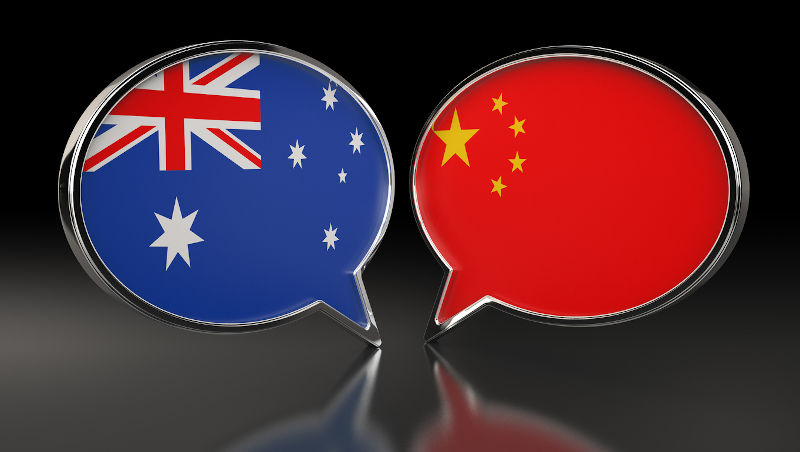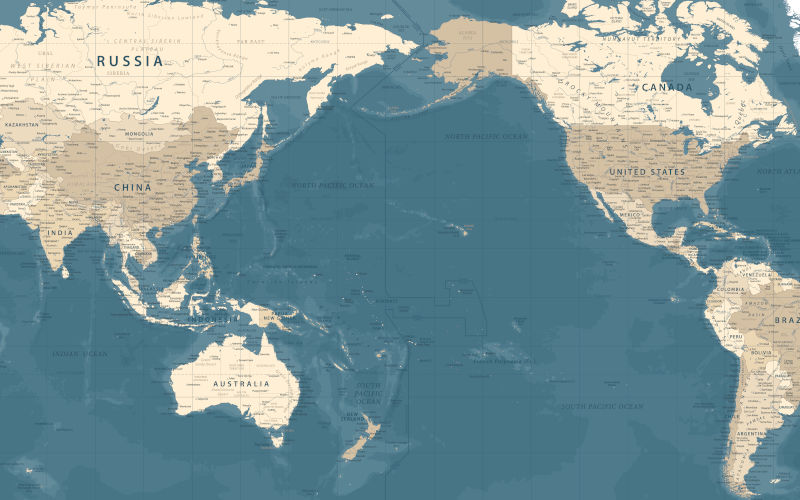Eighteen months ago, when Australians first learned of the AUKUS proposal for their country to build nuclear-powered submarines, it came as a stunning shock. So great was the shock, in fact, that for a time it eclipsed any serious debate about this revolutionary and quite unprecedented idea. An initiative of such scale and audacity seemed almost to defy critique and analysis. (more…)
Hugh White
-

Is Australia in the firing line of a new Chinese campaign against the US?
How can Australia navigate the tough and dangerous strategic environment in Asia today with America and China competing to be the leading regional power? The consensus in Canberra – on both sides of politics – is that we should stick as close as we can to America, in the hope it will win the contest. (more…)
-

If growing US-China rivalry leads to ‘the worst war ever’, what should Australia do?
Should Australia join the United States in a war against China to prevent China taking the US’s place as the dominant power in East Asia? Until a few years ago the question would have seemed merely hypothetical, but not anymore. (more…)
-
The price of primacy: Can the United States stop China becoming the dominant regional power?
In this episode of Democracy Sausage, eminent strategic studies expert Hugh White joins Mark Kenny to examine Australia’s strategy for dealing with rising tensions between the United States and China and the prospects for armed conflict in the region.
-

China threatens the West’s primacy, not its democratic systems
Some Western leaders, including Scott Morrison, have begun to describe the contest with China in starkly ideological terms, as a defence of democracy against authoritarianism. They say China threatens to replace the democratically-based “liberal international order” with a new order founded on the principles and practices of the Chinese Communist Party (CCP), which would endanger democratic societies everywhere. It is all very reminiscent of the old Cold War.
-
American overreach in Anchorage points to conflict with China
It’s fantasy to think that the US can still lay down the law as it attempted to in Alaska. Avoiding a Pacific war will take hard statecraft instead.
(more…) -
Australia in a no-win situation if Taiwan crisis escalates
Tensions are escalating between the US and China and the recent provocation over Taiwan on the part of both powers could well be a tipping point. Joe Biden will face an agonising choice if Beijing does poke the bear and call America’s bluff.
-
Why China has been exceptionally harsh on Australia (AFR Dec 17, 2020)
This is not a schoolyard, China is not a schoolboy, it hasn’t slunk away, and nothing about our predicament is as easy as the government would like us to believe. (more…)
-
Morrison has misread China
The Prime Minister thinks he can set the terms with Beijing. But hard choices and compromises are required to manage our region’s ruthless great power. (more…)
-
Whoever wins, Australia can’t rely on its great and powerful ally (AFR, Nov 4)
Geopolitics Donald Trump has done little to counter China, and Joe Biden would do no better. We must face up to a future of fading US power in our region. (more…)
-
Payne sensibly says no to Pompeo’s coalition of the willing (AFR 29 July, 2020)
Australia has avoided joining the Trump administration’s new cold war. But big questions about handling the escalating US-China rivalry remain unanswered.
-
Australia-China relations affected by COVID-19 crisis (RN Breakfast with Fran Kelly )
China has hit back at Australian calls for an international investigation into the origins and spread of the coronavirus pandemic.
Guest: Hugh White, Emeritus Professor of Strategic Studies, ANU.
-
Why Australia’s strategic situation is far worse than we think (AFR 6.7.20)
For all the dire warnings in last week’s defence review, its chief fault lies in being far too optimistic.
-
HUGH WHITE.- Australia’s Attack- class submarines need competition.(The Strategist 18.3.2020)
Australia’s strategic circumstances over the next few decades will mean we cannot afford to be without a submarine capability. (more…)
-
HUGH WHITE.-Why India isn’t going to save Australia from China’s power(EAF 15.3.2020)
Will India save us from China? (more…)
-
HUGH WHITE. Australia needs to give up its South Pacific dream (AFR 13-14.7.2019)
What can Australia do to restore and preserve our sphere of influence in the South Pacific, and deny it to China?
-
HUGH WHITE. Why Pacific nations would host a Chinese military base (AFR 13-14.7.2019)
Our neighbours’ commitment to values and interests shared with Australia might prove feeble in the face of Chinese persuasion.
-
HUGH WHITE. With China’s swift rise as naval power, Australia needs to rethink how it defends itself (The Conversation, 2 July 2019)
Visiting Wellington in April 1996, I fell into conversation with a very wise and experienced New Zealand government official. We talked about the still-unfolding Taiwan Straits crisis, during which Washington had deployed a formidable array of naval power, including two aircraft carrier battle groups, to the waters around Taiwan. The aim was to compel China to abandon a series of missile firings near Taiwan intended to intimidate voters in forthcoming presidential elections. (more…)
-
We must not join Trump’s cold war (AFR 25.6.2019)
Scott Morrison should spell out Australia’s opposition to Washington’s futile attempts to contain China.
-
HUGH WHITE. Canberra’s growing silence on US leadership in Asia
Sometimes what is left out of a major policy speech is as important as what is said. This was certainly true late in January when Australia’s Defence Minister Christopher Pyne spoke about regional security in a keynote address to a prestigious audience in Singapore.
-
HUGH WHITE. The US shouldn’t go to war with China over Taiwan—and nor should Australia (ASPI: THE STRATEGIST, 13 Feb 2019)
Paul Dibb, in his recent Strategist post, writes that America’s strategic position in Asia would be fatally undermined if it didn’t go to war with China if China attacked Taiwan, and that Australia’s alliance with America would be fatally undermined if we didn’t then go to war with China too. The conclusion he draws is that, in the event of an unprovoked Chinese attack on Taiwan, America should go to war with China, and so should Australia. (more…)
-
HUGH WHITE. The Costs of Containing China (East Asia Forum)
Washington’s policymakers at last understand that China is a serious strategic rival. For the first time since the Soviet collapse, they recognise that a major country is trying to expand its power and influence at the expense of US global leadership. (more…)
-
Hugh White: The New East Asian Jigsaw (The Straits Times (Singapore), Caixin Global (Beijing), 18.12.2018)
If 2018 was the year of unscrambling, the next year will offer a clearer picture of how the U.S.-China power struggle has reshaped the region, with Taiwan being a potential flashpoint
In 2018 all the big pieces in the East Asian international order were thrown up in the air. The U.S.-China economic relationship was transformed by a trade war, their strategic relationship became one of open and declared rivalry; Korean affairs took off on a new and quite unpredictable trajectory; Taiwan edged back towards a central place in regional geopolitics; and countries throughout Asia found themselves facing tougher and tougher choices between Washington and Beijing. (more…)
-
HUGH WHITE. The White Paper’s grand strategic fix: Can Australia achieve an Indo-Pacific pivot?
By far the most important and sobering part of the 2017 Foreign Policy White Paper is Figure 2.4. It offers the Treasury’s estimates of the sizes of the region’s key economies in 2030. They are calculated in purchasing power parity (PPP) terms, which adjusts for differences in prices and exchange rates to give a more accurate picture of the relative weight of different economies. The choice of PPP measures is deliberate: it gives the strategists’ view of GDP. (more…)
-
HUGH WHITE. Choosing between the US and China.
As strategic tensions have mounted in Asia this year, it has become steadily clearer that small and middle powers in the region — countries like Singapore and Australia — face a stark choice. But it isn’t, as some people suggest, a simple choice between accommodating China’s growing power or resisting it.
It is a much more complex choice about how far to support the United States as it pushes back against China’s increasingly assertive regional conduct, or whether to step back and leave the United States to confront China’s challenge alone. (more…)
-
Hugh White, Australia’s Defence White Paper and the China threat- a hidebound view of Asia’s future’
Any defence policy is ultimately based on a view of the international system and how it is expected to evolve over coming decades. These are the judgments that most fundamentally influence the nature and scale of armed conflict that a country’s forces must be prepared to fight. Australia’s new Defence White Paper makes two central judgments about this. First, that the post-Cold War, US-led international orderwill be maintained; and second, that it must be maintained.
Are these judgments correct? Let’s take them one at a time. First, will the ‘rules-based global order’ — as the White Paper calls it — survive over the next few decades, especially in Asia? The White Paper argues that it will, because the United States will remain ‘the pre-eminent global military power’ and ‘the world will continue to look to the United States for leadership’.
Many accepted this view in the 1990s, when America’s unchallengeable global primacy seemed to have created a unipolar order that marked the ‘end of history’. But it is much harder to believe this now, when the United States faces serious challenges in at least three key regions — the Middle East, Eastern Europe and Asia. In each of these regions, important players directly challenge US leadership.
And in each of these regions, US military power has so far proved insufficient to overcome these challenges. While no country can match the United States’ capacity to project force anywhere on the globe, the US has been unable to defeat major regional powers or even ill-armed insurgents on their own turf.
This is most obviously true in the Middle East and Eastern Europe, where America’s traditionally weak land forces offer no viable military options against regional adversaries. But it is also true in Asia, where the United States’ traditional mastery at sea is being very seriously challenged by China’s growing capacity for sea denial.
This is what makes the contest in the South China Sea so important. China’s stark defiance of US concerns about its conduct there, its willingness to militarise the confrontation and America’s inability to effectively respond indicate that US military power is no longer sufficient to resist the major challenge to the ‘rules-based global order’ in our region.
As I have argued elsewhere, China likely regards US and allied threats to use force in the South China Sea as bluffing. If so, there is no reason to hope that China will back off from its challenge or that the US-led regional order will be preserved.
Now that US primacy is no longer uncontested, the questions are what will replace the US-led order and how will this new order emerge.
The answers to these questions depend a great deal on how the United States and its allies, including Australia, respond to China’s challenge. This brings us to the second judgment in the White Paper — that the old order must be preserved.
The White Paper promotes a vision of the ‘rules-based global order’ as a seamless and indivisible whole that must be either preserved unaltered or surrendered in its entirety. And it sends a clear message that Australia should be willing to join a war against China to preserve it unaltered.
This is plainly wrong. There are many parts of the current international order. Some really are essential, like the prohibition on outright interstate aggression embodied in the UN Charter. Others are much less important, like the rules governing occupation of low tide elevations and the extent of territorial sea claims that they can support embodied in UN Convention on the Law of the Sea. To see them all as equally non-negotiable is absurd. The essential must be distinguished from the negotiable.
Australia has to decide whether leadership of the international order is essential or negotiable. This is what is really at stake in Asia today. Are we willing to concede to China a larger share of regional leadership? Or must we preserve sole US leadership at any price — even at the price of a major war? Anyone who reflects on the likely scale and nature of a US–China war will quickly conclude that it would be better to concede at least a share of regional leadership to China, frightening and difficult though that might be.
The more we are determined to preserve the current regional order unchanged, the more likely it is that it will be replaced not by a new, stable and peaceful order but by a protracted and catastrophic rivalry, and probably by conflict.
So what are the implications of the White Paper’s views of regional order for the defence policy it presents? The blithe assumption at the White Paper’s heart is that we can preserve the current rules-based order without serious military confrontation, because China will back down in the face of our threats. Consequently, it maintains that Australia needs no major changes to its defence policy. And for all the talk of a maritime build up and massive new funding, the government plans no major new capacities and no major funding commitments beyond those already laid down.
This may prove a big mistake. Over the next few decades, Australia will face a new order in Asia in which the United States will play a lesser role, and may even play no substantial strategic role at all.
If that happens, Australia’s forces would have to do much more independently, or with allies, than it has had to contemplate over the past four decades of uncontested US regional leadership. This is the challenge that Australia’s defence policy must address and which the White Paper has ignored.
Hugh White is Professor of Strategic Studies at the Strategic and Defence Studies Centre at The Australian National University. This article was first published in ANU East Asia Forum on 8 March 2016.
-
Hugh White on Australians and War from Honest History.
In my blog of 20 October ‘It is becoming much easier to go to war’ I highlighted the reasons and the background to developments since the Vietnam War that are making it much more likely that we will commit ourselves to war.
In an earlier posting of March 23 – see below – I carried an interview with Hugh White.
We are venturing into very dangerous territory. John Menadue
Repost
In this interview in November 2013 and related articles, Dr David Stephens of Honest History has drawn together comments by Hugh White on ‘Australians and war’.
Hugh White is professor of Strategic Studies at the ANU and a former senior public servant in the Department of Defence. He considers several themes about Australians and war.
- How ‘soft’ wars have made Australians more bellicose.
- How the perceived need to preserve the American alliance makes most wars acceptable in Australia.
- How Australians are reluctant to focus on the purpose of war.
- How Australians celebrate the experience of war while downplaying the reasons for particular wars; the centrality of Anzac.
- How romanticising war makes future wars more likely.
- How these chickens might all come home to roost in the East China Sea in the not too distant future.
The link for this interview can be found at:
http://www.honesthistory.net.au/
wp/stephens-david-hugh-white- on-australians-and-war/ and click on 188 Hugh White on Australians and War. Honest History (honesthistory.net.au) is a coalition of historians and others supporting the balanced and honest presentation and use of Australian history during the centenary of WWI.
